(HIpE) 2009 Program and Abstracts - Health Sciences - Curtin ...
(HIpE) 2009 Program and Abstracts - Health Sciences - Curtin ...
(HIpE) 2009 Program and Abstracts - Health Sciences - Curtin ...
You also want an ePaper? Increase the reach of your titles
YUMPU automatically turns print PDFs into web optimized ePapers that Google loves.
<strong>Abstracts</strong>The First 5 Minutes: An Inter-professional Learning (IPL) project using simulationKatherine Holmes, Nicky Deacy, Maggie Briggs & Ted Stewart-WynneRoyal Perth HospitalIt is well accepted that in the health care environment significant harm to patients occurs, frequently as a resultof errors in communication. With the increasing complexity of health care delivery the need for close,collaborative team work in an inter-professional learning (IPL) environment is recognised <strong>and</strong> recommended.With finite resources the drive to develop innovative clinical placements for health care under- <strong>and</strong> postgraduatestudents is great [COAG ref]. This study is designed to address these interacting issues.The primary objectives are to improve the quality of team work by enhancing communication <strong>and</strong> collaborationbetween health professionals, whilst providing an introduction to IPL in a low risk, simulated learning environment.Teams of six medical, nursing <strong>and</strong> physiotherapy students or postgraduates are provided with a pre-readingpackage discussing the concept of inter-professional learning, the basic life support algorithm, the MedicalEmergency Team (MET) calling criteria <strong>and</strong> the iSoBAR h<strong>and</strong>over checklist. The participants introducethemselves <strong>and</strong> their professions. The emergency scenario, in which their patient collapses, is discussed briefly.The facilitator then commences the scenario in which all members are expected to contribute to immediatemanagement of the patient. During the scenario the pause <strong>and</strong> discuss method of assisting the team is used.(Ref) The Medical Emergency Team (MET) leader arrives <strong>and</strong> a concise h<strong>and</strong>over of information, gathered inthe first 5 minutes, is required to be presented. Video recordings of the scenario are used for debriefing. Thefocus is on communication, leadership, <strong>and</strong> teamwork i.e. non-technical performance. The assessment tool usedto gather information on the individual <strong>and</strong> team performances will be presented. Scenarios were conductedweekly over a three month period – April to June <strong>2009</strong>.The information gathered during the 3 month evaluation period will be presented, together with the data on thestudents’ self-evaluation of their non-technical skills <strong>and</strong> attitudes to inter-professional team-work.The importance of communication <strong>and</strong> effective team work as integral to optimal clinical outcomes will behighlighted, with anticipated positive data. The next step is to design a study to assess how such a process mayimprove patient outcomes.Policy, process <strong>and</strong> strategy: Critical requirements of an IPL organisationKendra BellNext ChallengeKendra.bell@nextchallenge.com.auNext Challenge (NC) is a private community service organisation established by four allied health professionalswith a commitment to interprofessional practice. The organisation operates across four programs – Family,School, Contract (Third party) <strong>and</strong> Agency Support services. Each program relies on partnerships with stakeholdersto enhance community access to allied health services.From induction to the organisation, to internal policy, resources <strong>and</strong> process - the culture <strong>and</strong> systems of NCestablish <strong>and</strong> exp<strong>and</strong> its inter-professional learning focus. NC includes continual professional development activitiesthat share knowledge, <strong>and</strong> attempt to minimise training <strong>and</strong> professional biases. This exploration of differencesacross professions becomes a thought provoking journey for many professionals <strong>and</strong> students whocome into contact with NC.Importantly structural supports for IPL are in place. Across-profession sharing of information <strong>and</strong> knowledge areembedded in both policy <strong>and</strong> company process. Some procedural strategies are commonly present in manyservices such as integrated medical records, case notes, <strong>and</strong> team or case meetings. Other strategies includethe; Organisation structure <strong>and</strong> multi-layered opportunities for leadership, Core communicating strategiesthrough intranet rather than other modalities, Highly individualised program specific processes Internal wikilibrary that fosters <strong>and</strong> exp<strong>and</strong>s cross-fertilisation of knowledge <strong>and</strong> ideas across professions.This presentation will provide students embarking on clinical placements, <strong>and</strong> future graduates of allied healthprofessions - an awareness of how IPL is critically important for the organisation as a workplace. Strategies ofhow IPL can be integrated into a personal professional development journey will be demonstrated.<strong>Health</strong> Interprofessional Education (<strong>HIpE</strong> <strong>2009</strong>) — Student Conference 7


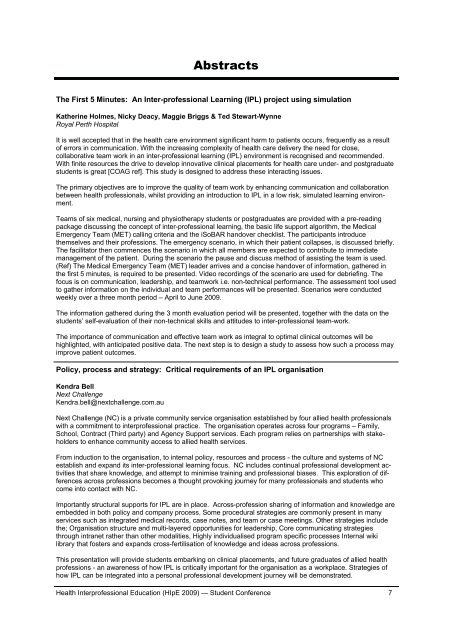
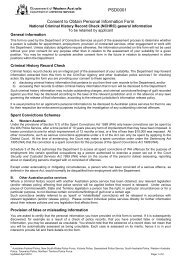
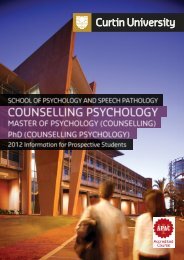
![Mental health commission report July 2010 - June 2011 [.pdf]](https://img.yumpu.com/50755705/1/184x260/mental-health-commission-report-july-2010-june-2011-pdf.jpg?quality=85)
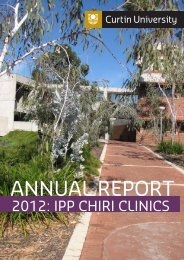
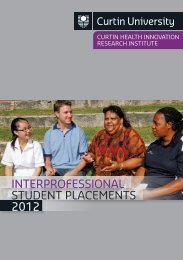
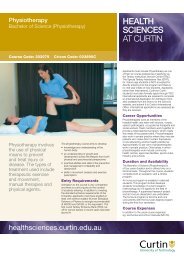
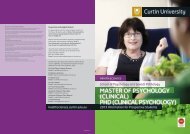
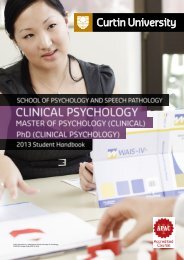

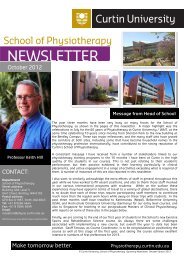
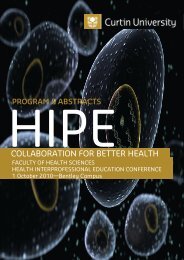

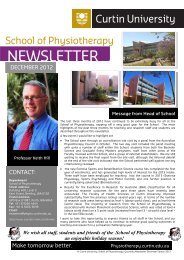
![2007 Annual Report [.pdf] - Health Sciences - Curtin University](https://img.yumpu.com/44476724/1/184x260/2007-annual-report-pdf-health-sciences-curtin-university.jpg?quality=85)